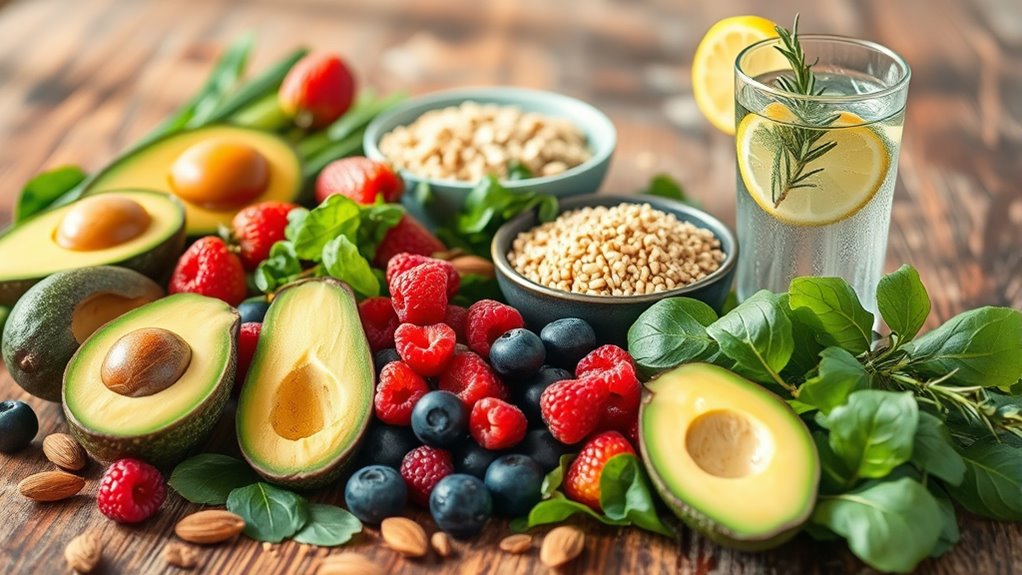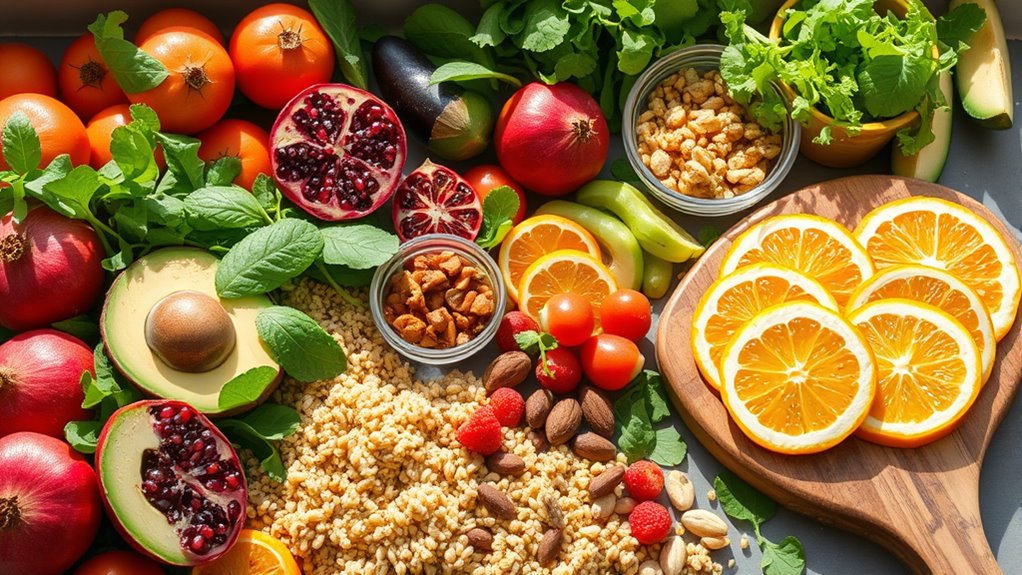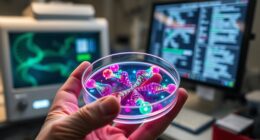To enhance your fertility, focus on a diet rich in whole foods like fruits, vegetables, whole grains, and healthy fats. Include omega-3 fatty acids from fatty fish and full-fat dairy for better reproductive health. Avoid processed foods, trans fats, and excessive alcohol or caffeine, as they can hurt your chances of conception. Incorporating these dietary changes can make a significant difference. Discover more about specific foods to boost your fertility and improve your chances of conception.
Key Takeaways
- Prioritize whole foods, including fruits, vegetables, and whole grains, to enhance fertility and support reproductive health.
- Incorporate healthy fats from sources like olive oil and fatty fish to boost fertility and improve insulin sensitivity.
- Include plant-based proteins, lean meats, and full-fat dairy products to promote ovulation and overall reproductive health.
- Focus on antioxidant-rich foods like berries and leafy greens to support egg and sperm health during conception.
- Avoid processed foods, trans fats, and excessive alcohol to optimize fertility and improve chances of conception.

When you’re trying to conceive, what you eat can significantly impact your fertility. A fertility diet focuses on nutrient-rich foods designed to enhance your reproductive health and increase your chances of conception. While diet alone can’t solve all fertility issues, it plays a crucial role in supporting ovulation and egg health. Given that millions worldwide face infertility, it’s essential to recognize the dietary choices you can control.
What you eat can profoundly influence your fertility, making a nutrient-rich diet vital for conception and reproductive health.
To build a solid foundation for your fertility diet, prioritize whole foods. Incorporate plenty of whole grains, fruits, and vegetables to ensure you’re getting the necessary nutrients. Healthy fats are another key component; think of monounsaturated and polyunsaturated fats found in olive oil and nuts. These fats can improve your overall health while supporting reproductive function. Approximately 50 million couples worldwide experience fertility issues, highlighting the need for effective dietary strategies.
When it comes to protein, consider plant-based options along with lean meats like fish. Full-fat dairy products have also shown promise in reducing anovulatory infertility, so don’t shy away from them.
Among the various diets, the Mediterranean diet stands out for its fertility benefits. It’s rich in vegetables, fruits, olive oil, and whole grains, contributing to better insulin sensitivity and reduced metabolic disturbances. Research indicates that following this diet can enhance your chances of conception and a successful pregnancy. In contrast, Western diets often lack these essential components and may negatively affect fertility.
As you plan your meals, include foods that support your reproductive health. Leafy greens are packed with iron and folate, crucial for fetal development. Omega-3 fatty acids found in fatty fish can also boost your fertility. Whole grains aid in insulin regulation, while folic acid is vital for preventing neural tube defects. Antioxidant-rich foods like berries and citrus fruits promote egg and sperm health, making them excellent choices for your diet.
Conversely, it’s equally important to avoid certain foods that can hinder your fertility. Processed foods often lack essential nutrients and may contain harmful additives. Trans fats and refined carbohydrates can negatively impact your reproductive health. Additionally, excessive alcohol consumption and high caffeine intake—over 500mg per day—can impair your chances of conception.
Consider a plant-based diet as another option. A higher intake of vitamins and nutrients can improve your overall health and hormone balance. While some women may need to avoid gluten due to sensitivities, research suggests that plant-based diets often correlate with better pregnancy outcomes.
Frequently Asked Questions
Can Stress Affect My Fertility Diet Results?
Yes, stress can definitely affect your fertility diet results. When you’re stressed, your hormone levels fluctuate, which can disrupt your reproductive functions.
You might find yourself making poor dietary choices, leaning towards unhealthy foods that don’t support your fertility. Additionally, stress can lead to sleep disturbances and lack of motivation for exercise, both of which are important for maintaining a healthy lifestyle.
Managing stress through relaxation techniques can help improve your fertility outcomes.
Is There a Specific Age to Start a Fertility Diet?
There’s no specific age to start a fertility diet, but the earlier, the better.
As you progress through life, especially approaching your 30s and beyond, your fertility begins to decline.
It’s smart to focus on your nutrition during your pre-conception phase, which starts at puberty and continues until menopause.
How Quickly Can I Expect Results From a Fertility Diet?
You might be surprised to learn that dietary changes can show results in just a few months.
If you commit to a fertility diet, you’ll likely notice improvements in your hormonal balance and overall health relatively quickly.
Remember, consistency is key—sticking to nutrient-rich foods helps build up essential nutrients over time.
Are There Fertility Supplements I Should Consider Alongside Diet?
When considering fertility supplements alongside your diet, it’s essential to consult your doctor first.
Supplements like DHEA, Myo-inositol, and CoQ10 may offer benefits, but the evidence varies. Folic acid and omega-3s are generally safe and beneficial for overall health.
Remember, a balanced diet often provides the nutrients you need. Be cautious about overdosing on supplements, as excessive intake can lead to unwanted health issues.
Prioritize safety and effectiveness in your approach.
Can I Still Consume Alcohol on a Fertility Diet?
Imagine your body as a garden. If you want it to flourish, you’ve got to nurture it properly.
While you might enjoy a drink now and then, consuming alcohol can hinder your garden’s growth, disrupting hormonal balance and affecting ovulation.
If you’re focused on fertility, it’s wise to limit or avoid alcohol. This way, you create an environment where your chances of blossoming into parenthood thrive.
Your body deserves the best care!
Conclusion
Incorporating a fertility diet can significantly boost your chances of conception. By choosing whole foods, healthy fats, and plenty of fruits and veggies, you’re nurturing your body for pregnancy. For instance, Sarah, who struggled with infertility for years, revamped her diet by adding avocados and whole grains. Within months, she noticed a positive change in her overall health—and eventually, she received the joyful news of her pregnancy. So, embrace these dietary changes; they could make all the difference!









